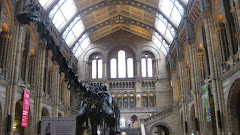I couldn’t find the exact quote I was looking for within the review, it being 85 pages, but it went on for awhile with the general idea that “morality would be mincemeat, law laughable, order out the window, music mere mating calls, religion ridiculous, higher sentiments heathenish slavering, and the world generally drowned in despair, chaos, and ruin,” if humans were related to primates. I know I’m abusing Sedgwick’s sincerely and strongly felt reaction to this idea of human evolution, but I can’t help wondering what the big deal is—why did Sedgwick, and why do so many people today, care so much about our apish descent? To my mind, being a part of the wonderful, rich, complex natural world around us doesn’t make us any less human. But others have been and still are deeply worried and hurt by the idea that humans are just another animal. Something in the way that we define humanity, whether by its accomplishments or its origins, or perhaps just what we’re used to from learning about the world as children, must account for this divide. In one of my favorite passages in any of the readings for this course, Thomas Huxley responds to concerns about man’s descent in his essay Evidence as to Man’s Place in Nature and attempts to persuade his readers that human dignity is not blasphemed by evolution, by comparing Darwinism to Lyellian geology:
We find it hard, Huxley writes, to believe a geologist when he says the grand mountain ranges “are of one substance with dullest clay, but raised by inward forces to that place of proud and seemingly inaccessible glory. But the geologist is right; and due reflection on his teachings, instead of diminishing our reverence and our wonder, adds all the force of intellectual sublimity, to the mere aesthetic intuition of the uninstructed beholder. And after passion and prejudice have died away, the same result will attend the teachings of the naturalist respecting that great Alps and Andes of the living world—Man. Our reverence for the nobility of manhood will not be lessened by the knowledge, that man is, in substance and in structure, one with the brutes…now he stands raised upon [Man’s intellect] as on a mountain top, far above the level of his humble fellows, and transfigured from his grosser nature by reflecting, here and there, a ray from the infinite source of truth.”

No comments:
Post a Comment